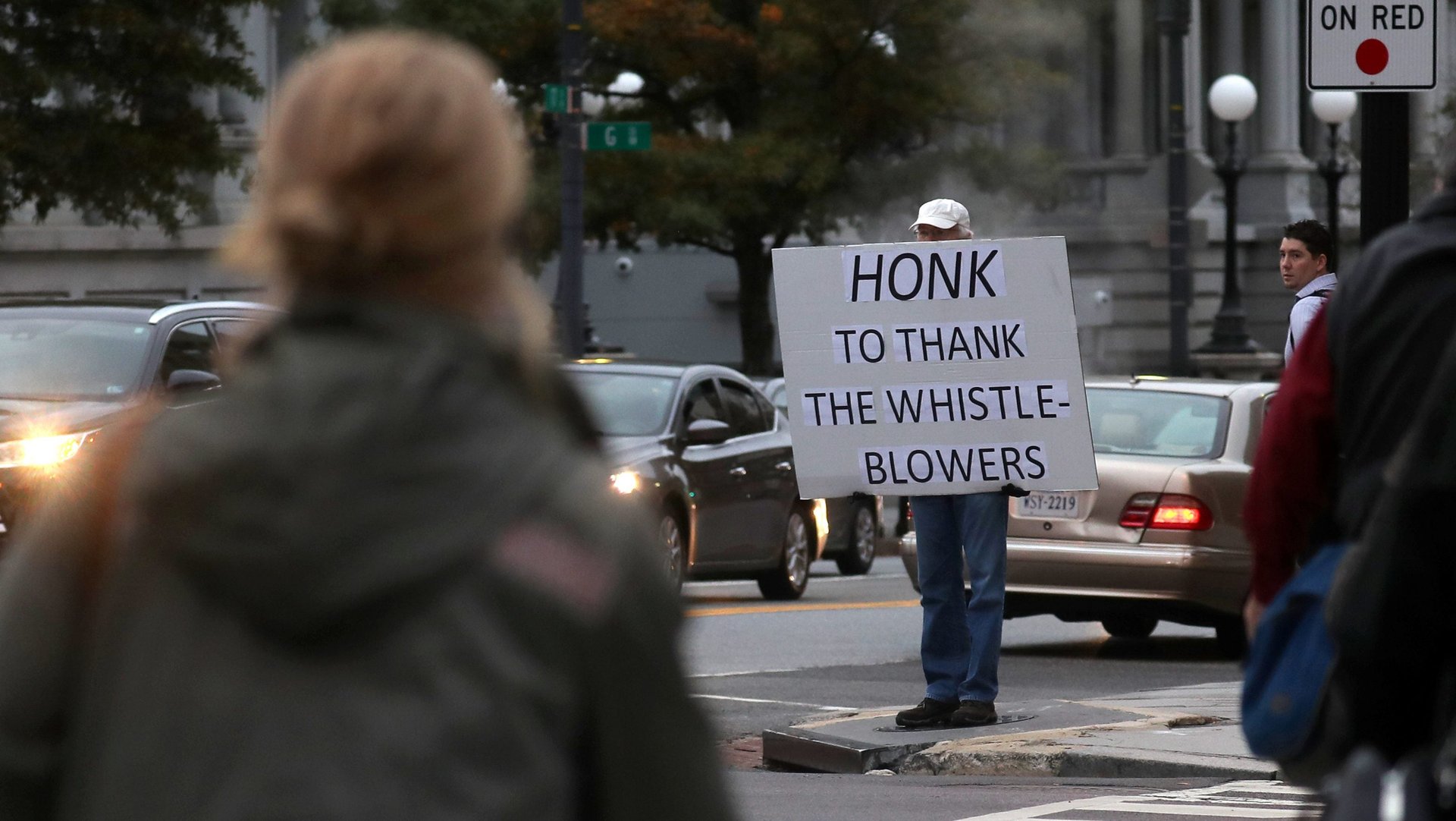Trump’s whistleblower tactics are straight out of America’s corrupt corporate playbook
When a then-anonymous whistleblower revealed information that set the machinery of impeachment proceedings in motion in Congress, president Donald Trump reacted in a display of his worst political instincts.


When a then-anonymous whistleblower revealed information that set the machinery of impeachment proceedings in motion in Congress, president Donald Trump reacted in a display of his worst political instincts.
Shoot the messenger (without really disputing what was revealed); surmise dark motives (again, ignoring the substance of the claims); threaten crippling legal action (even when taking such action is baseless). And, most important: Work diligently to make life miserable for the supposed antagonist.
We’re familiar with this type of presidential behavior. But there’s been less talk about how Trump’s response comes straight from the playbook of America’s most unscrupulous employers when accused by their employees of fraud or other misconduct.
As lawyers who have spent decades representing whistleblowers who expose corporate fraud, we know the ins and outs of navigating the often severe—and unfortunately, predictable—retaliation that befalls a person who reveals secrets that powerful interests are dead set on keeping hidden.
Corporate lessons
For instance, after the UK bank Barclays received an anonymous letter raising concerns about CEO Jes Staley’s decision to hire an old friend as a senior executive, Staley went on a witch hunt to identify the whistleblower. He did so despite rules that required him to respect the whistleblower’s request for anonymity. (Regulators smacked Staley with a $1.5 million fine and Barclay’s board tweaked his bonus, but Staley kept his job.)
Another common flavor of retaliation comes in the form of crushing legal fees. Tyler Schulz learned this after he exposed falsified lab tests conducted at blood-testing “disruptor” Theranos during his employment there. When Theranos and its high-flying lawyers threatened legal action to keep Schulz quiet, Schulz quipped that “fraud is not a trade secret.” Still, Schulz had to pay more than $400,000 to hire counsel to defend himself.
Or, retaliation can involve humiliation, as Tricia Newbold, a prior Trump administration whistleblower, cruelly learned. Newbold revealed this year that dozens of officials with histories of “significant disqualifying factors,”—which included conflicts of interest, drug use, and criminal misconduct—nonetheless got security clearances from the Trump White House, over the opposition of career staffers.
After she complained about the improper security clearances, Newbold, who has a rare form of dwarfism, found that her boss moved her files to a shelf beyond her reach.
The autoimmune reflex
In these worst cases, employers respond to whistleblowers like the immune system responds to disease: It fights the offending virus and tries to expel it from the body, supposedly to make it healthy again.
Physical energy is concentrated on the problem area, sometimes at the expense of other functions.
As the above examples show, in the corporate world, the spotlight is often trained on the whistleblower, rather than the misconduct they exposed. This can be an effective defense reflex. The purpose is to discredit, isolate, and professionally assassinate the person’s reputation and character. Was the person a star performer climbing in the organization’s ranks? Take away their responsibilities and neuter their ability to excel. Does the person have a promising future in the industry? Blackball them to ensure they have nowhere to turn. Does the person lean on co-workers for support? Make sure everyone understands the whistleblower is holding kryptonite and that consorting with them is professional suicide.
What’s so unfortunate about this reflexive autoimmune response is that it’s unilaterally terrible for any organization. In the case of corporations, new academic research shows that whistleblowers are actually good for a company’s bottom line. Somewhat counterintuitively, companies with more robust internal whistleblowing systems that get more complaints are healthier than those that don’t.
Such companies are sued less frequently, for one. And if they are sued, they have considerably less liability than companies where employees can’t report misconduct in real time.
For corporations, whistleblowers are the good bacteria that makes a corporation’s body stronger. Enlightened corporate leaders understand that, far from needing to be expelled, whistleblowers must be encouraged and supported. Senior managers who foster an open-door culture, where employees are encouraged to raise concerns without fear of reprisal, can fix a problem long before they have to call on hired-gun crisis managers. Simple logic dictates that corporate managers have a financial interest in discovering a problem—before it becomes a scandal.
These are some of the key reasons behind Congress’s repeated initiatives to encourage, incentivize, and protect whistleblowers from retaliation in corporate America. And they’re also the motivation behind Congress’s attempts to protect government whistleblowers, like the Civil Service Reform Act, which protects the rights of government employees who report wrongdoing, and the Whistleblower Protection Act, which protects disclosure of information as well as a government employee’s refusal to participate in wrongful activities.
Trump’s reaction to the intelligence whistleblower mirrors the very behavior that has been proven to weaken corporations in similar situations.
While the country reels, Trump and his henchmen are calling for the whistleblower’s head. In a recording with a private audience, Trump dubbed the whistleblower “almost a spy” and suggested the person is guilty of “treason.” He mused that the government should “handle” the whistleblower like it did “in the old days”—which, in traditional mafioso vernacular, means execution.
Trump’s vicious smearing of the whistleblower is not only outrageous and unethical, but his persistent demand to reveal the whistleblower’s identity violates the laws he swore to faithfully execute upon taking office. It also jeopardizes the whistleblower’s safety.
Just as critically, Trump’s attacks give official sanction on a national level to the old-school way of treating whistleblowers.
Reverting to the tired tropes that vilify whistleblowers as snitches and rats threatens to set back the growing recognition that whistleblowers help organizations far more than they hurt them. As Trump’s economy falters, that’s not something American businesses—or legal system—can afford.